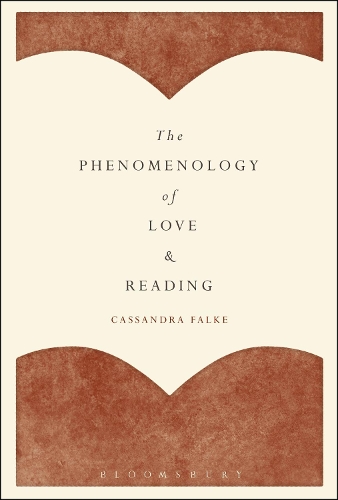
The Phenomenology of Love and Reading
(Hardback)
Available Formats
Publishing Details
The Phenomenology of Love and Reading
By (Author) Professor Cassandra Falke
Bloomsbury Publishing PLC
Bloomsbury Academic USA
17th November 2016
United States
Classifications
Tertiary Education
Non Fiction
809.933543
Physical Properties
Hardback
192
Width 152mm, Height 229mm
422g
Description
The current revival of interest in ethics in literary criticism coincides fortuitously with a revival of interest in love in philosophy. The literary return to ethics also coincides with a spate of neuroscientific discoveries about cognition and emotion. But without a philosophical grounding this new work cannot speak convincingly about literature's relationship to our ethical lives. Jean-Luc Marion's articulation of a phenomenology of love provides this philosophical grounding. The Phenomenology of Love and Reading accepts Jean-Luc Marions argument that love matters for who we are more than anythingmore than cognition and more than being itself. Cassandra Falke shows how reading can strengthen our capacity to love by giving us practice in loves habitsattention, empathy, and a willingness to be overwhelmed. Confounding our expectations, literature equips us for the confounding events of love, which, Falke suggests, are not rare and fleeting, but rather constitute the most meaningful and durable part of our everyday life.
Reviews
To write on phenomenology and literature requires an author who reads with exacting delicacy and who construes demanding philosophy with a high level of clarity. Cassandra Falke is just this person. The Phenomenology of Love and Reading is a book of twofold significance: at once an invitation to read literature with Jean-Luc Marion, eminent phenomenologist of love, and a study of what is involved when we readreally readnarrative fiction and poetry. * Kevin Hart, Edwin B Kyle Professor of Christian Studies, University of Virginia, USA *
In order for we readers to know a literary text on its own, multiple terms, our love has to be in play: this is the key insight that Cassandra Falke develops in this clearly written, illuminating, and extraordinarily wise book. Through a series of incisive chapters that unfold Jean-Luc Marions rich phenomenology of love in relation to the historical features of the phenomenological method, various phenomenologies of reading, and contemporary literary theory, Falke persuasively offers not only an argument for but a performance of what she terms charitable reading: an approach to reading characterized by specifically erotic modes of receptivity and attention to the literary texts burgeoning givenness. Falke shows how and why the loving readers experiences with the texts phenomenality form the way he or she encounters embodied persons outside the text, such that erotic reading becomes a pedagogy of love. Falkes book invites us to understand nothing less than how the knowing we achieve through loving reading is integral to the loving relations that constitute the very flesh and blood of our lives. * Stephen E. Lewis, Professor and Chair of English Department, Franciscan University of Steubenville, USA *
One of the professed goals of this work is to bring the theology of French philosopher Jean-Luc Marion (b. 1946) together with literary criticism. Marion is an important thinker in the phenomenological tradition, and in recent times he has become one of the leading voices in contemporary theology. But until now the relevance of Marions work had not reached the field of literary theory, and this book attempts to forge that connection. Falke (English literature and culture, Univ. of Troms, Norway) focuses on the theme of love, which, according to Marion, takes precedence over all other experiences. In the introduction the author writes that criticism should itself be an act of love; indeed, it should not be separate from the rest of life, and it should add something to the world. This is because literature expands one, and books provide an elsewhere that takes the reader away from ordinary self-possession. And so, it seems, one can cultivate the capacity for love through reading that enhances loves virtues, including attention, empathy, and a willingness to be overwhelmed. Falke reflects thoughtfully on the phenomenology of reading, and shows the relevance of Marions claim that erotic reduction is the key to who one is. Summing Up: Recommended. * CHOICE *
For Falkelove is a submission of the ego to the other, not in submitting to the domination by the other, but in putting aside ones ego desires, and opening ones self to becoming changed by the otherwhether or not the other reciprocates the love That in short form is the challenge Falke poses to the reader of her book: allow at least the literary book, if not the theoretical and argumentative book, for the most part, to change your inner self, rather than coming to the book with a sense of a need to control, own, and dominate. Moreover, not only does Falke construct a theoretical structure for developing her thesis of reading as erotic love, as a form of allowing the book to speak to you in its own terms, from its own frame of reference, Falke also, provides a practicum for how to perform the erotic reduction of a text The adoption of erotic reduction is a logical necessity, even when psychologically difficult, if our goal is to get inside the mind of the book, as it were. * Literature and Theology *
Falkes book reaffirmed my conviction of the high aesthetic significance of Marions phenomenology. Exemplary are the lovely pages she devotes to Marions discovery of everyday lifes richness ... Phenomenology conjoins art and lifethis is Falkes chief, invaluable insight. * The Heythrop Journal *
Author Bio
Cassandra Falke is Professor of English Literature and Culture at the University of Troms, Norway. Her previous books include Literature by the Working Class: English Autobiography, 1820-1848 (2013) and, as editor, Intersections in Christianity and Critical Theory (2010). She has also published articles about English Romanticism, literary theory, and liberal arts education.
